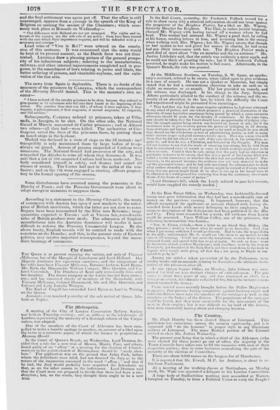At the Middlesex Sessions, on Tuesday, S. NV. Spurr, an
apothe- cary's assistant, refused to be sworn, when called upon to give evidence in a case of assault. He was not a Quaker or Moravian, but simply stated that he bad a conscientious objection to take an oath on so slight an occasion as an assault. The law provided no remedy, and the witness was discharged. In his charge to the Jury, Sergeant Adams particularly alluded to the conduct of the witness, and the ne- cessity of an alteration in the law, by which the difficulty the Court had experienced might be prevented from recurring- " They had that day had the most singular exhibition he had ever witnessed in any court of justice, and one which presented a practical illustration of the necessity of some legislative enactment being passed by which a more extensive allowance should be made for the dictates of conscience. At the same time, care should be taken that the Court should have an opportunity ofjudging whe- ther the scruple against being sworn was founded on reason or not ; for if the
enactment were to give to every person the power of indulging in all descrip- tions of whims and fancies, it would proceed so far until at length he was afraid they should see the wholesome system of administering justice, as well as many other ancient usages and good customs, totally upset. litre Wilti a man who told them that he did not object to an oath if the case should, in his estimation, re- quire it ; and that he was a Christian, and believed in the Gospels. The man did not venture to say that the mode of swearing was wrong, but he told theta that he considered eilse4 of assault as cases in which evidence ought not to be taken on oath. Could it then be said, seeing that the party had no objection in parliculat instances to be sworn, that this was a proof of his having what was called a tender conscience, or whether the idea was not pelfectly absurd ? For- tunately, its the preset t instance, the evidence was not very material to make 'out the prosecutor's ease; and he had only mentioned the circumstance to show what endless absurdity awl denial of justice might be arrived at if every trivial fancy that any person might think tit to allow to rise up in his breast were to he admitted as a valid ground fr excusing him front the customary observance of one of the forms of a court of justice."
[Lord Denman's bill, which the Lords refused to pass last session, would have supplied the remedy needed.]


























 Previous page
Previous page